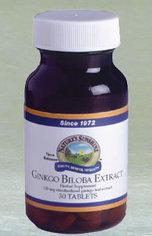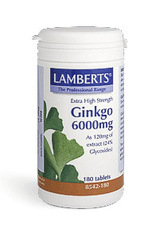Ginkgo Biloba
|
30 Tablets
Delivery from Nature's Sunshine Prices plus postage Subscribers - buy 2 and save £5 4 for the price of 3 available to all! Dose Humans: Take 1 tablet with breakfast daily. If used for animals you should adjust the dose accordingly/in accordance with your healthcare professional. |
180 Tablets
Due to this product not being one of our suppliers own products they are unable to offer us a discount. Therefore it will be cheaper for you to buy this direct from them. Please click on the link below and
use their search box to order. |
Ginkgo Biloba, Time-Release (Nervous, Circulatory).
The growing body of research shows that the extract from the leaves of the oldest tree on earth promotes optimal blood circulation to the brain. You know this supplement as ginkgo biloba, one of the top-selling herbs in Europe.
A powerful free radical scavenger, ginkgo helps protect blood vessels and optimises the amount of oxygen supplied to brain cells. About 50 pounds of ginkgo leaves are required to produce one pound of extract.
The research on Ginkgo extract has yielded three main areas of activity:
1) Dilation of Blood Vessels
Ginkgo inhibits an enzyme that causes blood vessel relaxation. It also acts with receptors in the vascular endothelium to release endothelium-derived relaxing factor and the prostaglandin, prostacyclin. Greater tone in the venous system improves circulation in ischemic areas where toxic metabolites build up and oxidation of lipid components is more likely to occur. The effect of Ginkgo extract is more pronounced in areas of ischemia than in normally perfuse tissue (Pietri et al (1997) J. Mol. Cell Cardiol 29: 733-724).
2) Inhibition of platelet activating factor (PAF)
PAF is involved in platelet aggregation, neutrophil degranulation and activation, enhancing vascular permeability, smooth muscle contraction and reduction of coronary blood flow. Ginkgo extract competes with PAF for binding sites and inhibits many of the PAF actions.
3) Antioxidant activity
Ginkgo extract is involved in the prevention of free radicals. It inhibits lipid peroxidation of lipid membranes and scavenges superoxide, hydroxyl and peroxyl radicals. In a 1997 study, Ginkgo was shown to have an inhibitory effect on nitric oxide (NO) in macrophages (Kobuchi et al Biochem Pharmacol 53;6:897-903).


